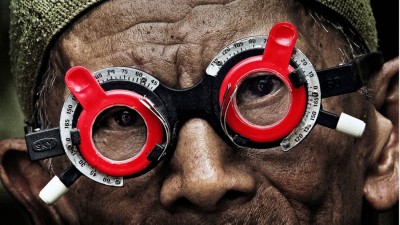The Look of Silence
Plays October 29-31 at Cinematheque
Joshua Oppenheimer is a genius on a mission. He exploded onto the documentary film circuit in 2012 with his Oscar-nominated feature The Act of Killing. That film focused on the Indonesian genocide of 1965-66, the perpetrators of which still remain in power. Oppenheimer invited the leaders of genocidal death squads to direct short films reenacting their murderous exploits, a task they gleefully performed in varying cinematic genres.
The films expose truths withheld from the Indonesian public, an act so dangerous that Oppenheimer’s Indonesian co-director remains anonymous to this day, as do 48 other crew members.
Oppenheimer and his anonymous co-director return in The Look of Silence, a follow-up to The Act of Killing. While the first film focused on the perpetrators of genocide, this focuses on survivors.
The film’s protagonist, Adi, is an optometrist born two years after the genocide. His brother Ramli was one of its millions of victims. While the two never met, the event has clearly shaped Adi’s life. His elderly mother still deals with profound grief, and his centenarian father struggles to remember his dead son.
In an act of bravery that’s difficult to comprehend, Adi visits the death squad leaders responsible for Ramli’s murder. In some cases, the men are accompanied or represented by their families. Adi interviews them about the murders, tries to understand how they’ve lived with their crimes for fifty years, and attempts to reconcile.
The perpetrators come from all walks of life. Some are ordinary villagers. Others are wealthy political leaders, still capable of silencing dissent through violence (a fact they’re eager to remind Adi of). One is his own uncle, who guarded Ramli and other political prisoners waiting to be taken to the killing fields.
The wisdom with which Adi approaches these interviews is truly inspiring. He has every right to be angry and accusatory, but he never is. He tries to understand his brother’s killers. He doesn’t want vengeance, only truth. Truth is still a dangerous thing to ask for in Indonesia, and the filmmakers successfully convey the massive risk Adi takes in initiating these peaceful conversations.
The reactions of the killers are almost as disheartening as Adi is inspiring. Their unwillingness to accept responsibility for their crimes is infuriating. That admission of guilt came as a tragic, cathartic event in The Act of Killing, and Oppenheimer wisely withholds it here.
The brief glimmers of hope come from some of the killers’ children, who make genuine attempts at reconciliation. It’s telling that, like Adi, it’s those born after the genocide who are most willing to take the steps to accept responsibility.
One woman boasts of her father’s role in the genocide, only to hear him describe the killings for the first time. Her horror at the truth leads to her offering apologies to Adi, asking forgiveness, and asks him to consider himself a part of her family, and her part of his.
But for everyone who’s willing to take accountability, there’s someone pleading ignorance. In dialogue that should sound all too familiar to any Canadian, people tell Adi to get over it, asking why he’s reopening wounds that have already healed. It couldn’t be more obvious that, for survivors, those wounds have never healed. In fact, they require immediate attention.







